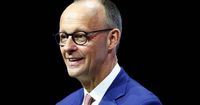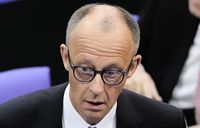Friedrich Merz has officially become the new Chancellor of Germany, elected on May 6, 2025, in a dramatic turn of events that saw him secure the position after facing an unprecedented setback in the first round of voting. The 69-year-old leader of the Christian Democratic Union (CDU) initially fell short of the required majority, garnering only 310 votes out of the 316 needed to win outright in the Bundestag, the German parliament.
Merz's election came after his party emerged victorious in the legislative elections held at the end of February 2025. Following this success, he formed a coalition with the center-left Social Democratic Party (SPD), which played a crucial role in his eventual victory. After a tense first round, Merz returned to the floor for a second vote and successfully secured an absolute majority, receiving 325 votes from a total of 630 deputies.
Born on November 11, 1955, Merz started his political career in the 1980s as a member of the European Parliament and later as a Bundestag member. He previously led the CDU/CSU conservative bloc until being ousted by Angela Merkel in 2002, a loss that has defined his political narrative ever since. Known as the "anti-Merkel," Merz's return to the political forefront has been marked by a mix of anticipation and skepticism.
On the day of his election, Merz brought a ten-liter keg of beer from his native Sauerland to celebrate what he expected to be a straightforward victory. However, the day unfolded differently than planned. The first vote, scheduled for 9 AM, turned into a near-disaster as 18 deputies from the CDU-CSU/SPD coalition opted not to support him, resulting in the first failure of a Chancellor candidate to secure a majority since 1949.
Despite this setback, Merz's supporters and the media reported a sense of relief when he finally achieved the necessary votes in the second round. His election marks a significant moment in German politics, especially given the challenges facing the nation, including economic pressures and the need for a robust response to migration issues.
Merz's political stance has often been characterized by a strong pro-European sentiment. He has emphasized the importance of Germany's role within the European Union, stating, "Deutschland ist zurück in Europa" ("Germany is back in Europe"). This sentiment reflects his commitment to strengthening Franco-German relations, which have been strained in recent years. His first official visit as Chancellor is set for May 7, 2025, when he will travel to France to meet with President Emmanuel Macron.
Throughout his career, Merz has been a vocal advocate for European integration and has pledged to dedicate 60 to 70 percent of his time during his first year in office to European affairs. He has expressed a desire to mend the often fraught relationship between Berlin and Paris, which has seen contrasting leadership styles from Macron and outgoing Chancellor Olaf Scholz.
However, Merz's path to leadership has not been without controversy. In January 2025, he voted alongside the far-right Alternative for Germany (AfD) party on a resolution concerning migration, an action that sparked significant backlash and protests across the country. Critics have raised concerns about this alignment, especially as Merz has promised a hardline approach to migration, vowing to reverse the welcoming policies established by Merkel during her tenure.
As he embarks on this new chapter, Merz faces the daunting task of addressing not only the internal divisions within his coalition but also the broader challenges confronting Germany. His administration will be scrutinized for its ability to navigate economic uncertainties and to manage the complex landscape of migration and integration.
In the wake of his election, analysts have pointed out the fragility of Merz's position. While he has made significant strides in his political career, his lack of experience in governing—having never held a ministerial or mayoral role—could pose challenges as he attempts to implement his vision for Germany.
Merz's election signifies a pivotal moment for the CDU, which has struggled to regain its footing in the post-Merkel era. With a clear agenda focused on national pride and a return to conservative values, Merz aims to reshape the political landscape and restore confidence in Germany's leadership.
As the dust settles from this historic election, the upcoming months will reveal whether Merz can unite his party and coalition, implement his policies effectively, and restore Germany's standing on the European stage. His journey from a long-time political contender to Chancellor is a testament to the unpredictable nature of politics, and many will be watching closely to see how he navigates the complexities of his new role.
Friedrich Merz's ascent to the Chancellorship is not just a personal victory; it represents a broader shift in German politics. With a commitment to a more conservative agenda and a focus on European unity, his leadership will undoubtedly shape the future of Germany and its relationship with the EU.





